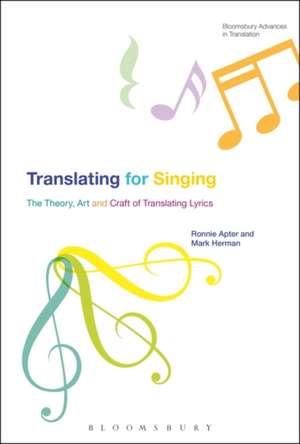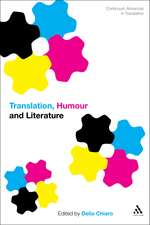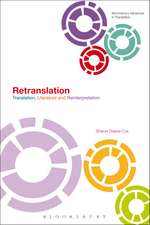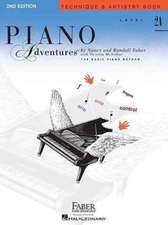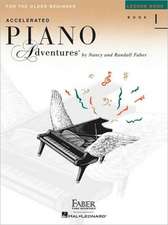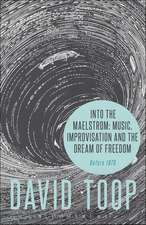Translating For Singing: The Theory, Art and Craft of Translating Lyrics: Bloomsbury Advances in Translation
Autor Ronnie Apter, Mark Hermanen Limba Engleză Paperback – 18 mai 2016
| Toate formatele și edițiile | Preț | Express |
|---|---|---|
| Paperback (1) | 181.77 lei 6-8 săpt. | |
| Bloomsbury Publishing – 18 mai 2016 | 181.77 lei 6-8 săpt. | |
| Hardback (1) | 717.37 lei 6-8 săpt. | |
| Bloomsbury Publishing – 18 mai 2016 | 717.37 lei 6-8 săpt. |
Din seria Bloomsbury Advances in Translation
- 23%
 Preț: 192.55 lei
Preț: 192.55 lei - 22%
 Preț: 257.03 lei
Preț: 257.03 lei - 21%
 Preț: 218.74 lei
Preț: 218.74 lei - 22%
 Preț: 225.24 lei
Preț: 225.24 lei - 22%
 Preț: 256.20 lei
Preț: 256.20 lei - 23%
 Preț: 198.30 lei
Preț: 198.30 lei - 22%
 Preț: 230.79 lei
Preț: 230.79 lei - 14%
 Preț: 197.77 lei
Preț: 197.77 lei - 23%
 Preț: 192.48 lei
Preț: 192.48 lei - 22%
 Preț: 238.22 lei
Preț: 238.22 lei - 22%
 Preț: 259.34 lei
Preț: 259.34 lei - 23%
 Preț: 198.30 lei
Preț: 198.30 lei -
 Preț: 217.62 lei
Preț: 217.62 lei - 13%
 Preț: 257.03 lei
Preț: 257.03 lei - 13%
 Preț: 263.62 lei
Preț: 263.62 lei - 30%
 Preț: 569.06 lei
Preț: 569.06 lei - 13%
 Preț: 238.94 lei
Preț: 238.94 lei - 30%
 Preț: 598.45 lei
Preț: 598.45 lei - 22%
 Preț: 239.02 lei
Preț: 239.02 lei - 23%
 Preț: 197.86 lei
Preț: 197.86 lei - 22%
 Preț: 256.59 lei
Preț: 256.59 lei - 11%
 Preț: 344.52 lei
Preț: 344.52 lei - 23%
 Preț: 191.04 lei
Preț: 191.04 lei - 24%
 Preț: 189.70 lei
Preț: 189.70 lei - 22%
 Preț: 258.42 lei
Preț: 258.42 lei - 13%
 Preț: 256.59 lei
Preț: 256.59 lei - 13%
 Preț: 257.12 lei
Preț: 257.12 lei
Preț: 181.77 lei
Preț vechi: 209.42 lei
-13% Nou
Puncte Express: 273
Preț estimativ în valută:
34.78€ • 36.31$ • 28.79£
34.78€ • 36.31$ • 28.79£
Carte tipărită la comandă
Livrare economică 05-19 aprilie
Preluare comenzi: 021 569.72.76
Specificații
ISBN-13: 9781472571885
ISBN-10: 1472571886
Pagini: 312
Dimensiuni: 156 x 234 x 18 mm
Greutate: 0.5 kg
Editura: Bloomsbury Publishing
Colecția Bloomsbury Academic
Seria Bloomsbury Advances in Translation
Locul publicării:London, United Kingdom
ISBN-10: 1472571886
Pagini: 312
Dimensiuni: 156 x 234 x 18 mm
Greutate: 0.5 kg
Editura: Bloomsbury Publishing
Colecția Bloomsbury Academic
Seria Bloomsbury Advances in Translation
Locul publicării:London, United Kingdom
Caracteristici
Covers the linguistic problems involved in translating words to be sung to pre-existing music, including those of rhythm, syllable count, vocal burden, rhyme, repetition, and sound; and ways of solving them
Notă biografică
Ronnie Apter is Professor Emerita of English at Central Michigan University, USA. She is the author of two books, Digging for the Treasure: Translation After Pound (Lang, 1984; reprint Paragon House 1987) and A Bilingual Edition of the Love Songs of Bernart de Ventadorn in Occitan and English: Sugar and Salt (Mellen, 1999). She is the author or co-author of numerous articles which have appeared in American journals such as Ars Lyrica and Translation Review and in the British journal In Other Words, and of poetry translations appearing in Two Lines, The Literary Review, The New Orleans Review, Metamorphoses, The Classical Outlook, and elsewhere, and in several anthologies. Many of her 22 translations of operas, operettas, and choral works, written in collaboration with Mark Herman, have been performed in the United States, Canada, England, and Scotland, and have been praised in periodicals ranging from The New York Times to The [London] Times.Mark Herman is a literary translator, technical translator, chemical engineer, playwright, musician, and actor. For over two decades he has written the 'Humor and Translation Column' appearing monthly in The ATA Chronicle, the journal of the American Translators Association. Many of his book reviews have appeared in Ars Lyrica. He frequently collaborates with Ronnie Apter.
Cuprins
FrontispieceForeword by Jonas ForssellAbout This BookAcknowledgements Copyright Acknowledgements1. Translation and Music2. Singable Translations3. Foreignization And Domestication4. Adaptation and Re-Translation5. Dealing With Difference6. Censorship and Taboos7. Once Upon Which Time?8. Verbal Delineation Of Character9. Multiple Translations10. When the Music is Missing11. Verbal and Musical Form12. Music and MeaningAfterwordBibliographyIndex
Recenzii
For those who love opera and the broader genre of lyric theater, and perhaps most particularly for those of us who are engaged in making it, selling it, teaching it, and striving to find and develop our own successors on stage and in the audience, Translating for Singing offers an important contribution to the discussion. My own modest proposal for its dissemination would be to find a way to place a copy on the desk of every opera house management, on the office chair of every Conservatory dean, opera director, and voice teacher in the UK and USA, and of course in the hands of anyone who is brave enough to engage in the traitorous act of opera translation.
This book is an invaluable guide to anyone who wishes to translate opera or musicals for performances.
No one else could have written this book - certainly not with [Ronnie Apter and Mark Herman's] depth and range of knowledge and practical experience ... [Their] admirable and ambitious aims are carried through with erudition, wit and humour ... This book is a towering achievement, setting out the theory, practice and pitfalls of the art and craft of singing translation in comprehensive detail ... Essential reading for anyone actively involved -- or merely interested - in the process of creating singable opera translations.
A welcome contribution, especially as the book is handsomely designed, [that] contains a wealth of music examples in neat notation, with original lyrics in Italian, German, French, Czech and Russian, all glossed into English and compared with numerous authentic translation examples (by Apter and Herman and others), and is filled with good advice for anyone interested in the practical business of translating texts to be sung.
The authors' passion for their craft shines through every line of this book, and their authority is confirmed by the sheer number of commissions they've received from opera companies and the resultant published libretti, as well as the copious examples of their work provided in the book itself. They have undoubtedly provided prospective translators and students of translation with perhaps the definitive discussion of the subject, one that should endure as both a record of past practice and a guide for the future.
[An] excellent textbook ... [This] volume - with its careful and quirky examination of singability, foreignization versus domestication, issues of difference and characterization, the finer points of prosody - could serve as an aid to any translator of lyrics and poetry, no matter the genre. Brimming with personality and fabulous examples, Translating For Singing is a must-have for the serious translator.
A thorough and expert guide ... This is a book written with wit, expertise and enthusiasm, full of illuminating examples; a satisfying and informative read.
Reading this book will provide a great deal of pleasure in that it is well written, well referenced, rich in examples, and full of humor . Translating for Singing is a fine work for anyone interested in the translation of song (translators, students mastering in translation, teachers, researchers...), but it also can be of interest to everyone who studies the translation of poetry or drama.
[Offers] practical advice about all aspects of translation.
This work has enormous merit . and a rich catalogue of examples and advice that will be music to the ears.
Apter and Herman's step by step story of operatic translation studies the endless variety of the human emotions of the operatic genre to illustrate the technical fieldwork of English compensation (foreignization, domestication). The vocal translation of Translating for Singing opens the new field of the poetico-dramatic maelstrom of creativity and imagination.
In this book, Ronnie Apter and Mark Herman, two highly experienced and talented opera translators, take us on a journey into the beautiful yet complex world of the translation of singable lyrics for performance. The book is rich with examples from Apter and Herman's own practice as well as the work of others, and their passion undeniably comes through. This is a must read for anybody who is interested in knowing how singable English versions of operas and song come to life.
This richly detailed volume by two of the most experienced and skilled translators working today offers a wealth of sound advice and excellent (at times, entertaining) examples. Even if you never intend to create or adapt a translated singing text, the insights you will glean about the art of translation and the nuances of text setting from Translating for Singing will inform your interpretations and understanding of operatic texts in important ways.
Herman and Apter's labour of love should be roundly applauded; this is a valiant attempt to examine every aspect of the tricky and controversial art of opera translation. Their scrutiny of the challenges a translator has to face is exhaustively accompanied by examples both modern and ancient, these being further enlivened by erudite observations on the history of opera in translation as well as the relevant literature that inspired the librettos. A tricky subject is definitively and deftly handled.
This book is an invaluable guide to anyone who wishes to translate opera or musicals for performances.
No one else could have written this book - certainly not with [Ronnie Apter and Mark Herman's] depth and range of knowledge and practical experience ... [Their] admirable and ambitious aims are carried through with erudition, wit and humour ... This book is a towering achievement, setting out the theory, practice and pitfalls of the art and craft of singing translation in comprehensive detail ... Essential reading for anyone actively involved -- or merely interested - in the process of creating singable opera translations.
A welcome contribution, especially as the book is handsomely designed, [that] contains a wealth of music examples in neat notation, with original lyrics in Italian, German, French, Czech and Russian, all glossed into English and compared with numerous authentic translation examples (by Apter and Herman and others), and is filled with good advice for anyone interested in the practical business of translating texts to be sung.
The authors' passion for their craft shines through every line of this book, and their authority is confirmed by the sheer number of commissions they've received from opera companies and the resultant published libretti, as well as the copious examples of their work provided in the book itself. They have undoubtedly provided prospective translators and students of translation with perhaps the definitive discussion of the subject, one that should endure as both a record of past practice and a guide for the future.
[An] excellent textbook ... [This] volume - with its careful and quirky examination of singability, foreignization versus domestication, issues of difference and characterization, the finer points of prosody - could serve as an aid to any translator of lyrics and poetry, no matter the genre. Brimming with personality and fabulous examples, Translating For Singing is a must-have for the serious translator.
A thorough and expert guide ... This is a book written with wit, expertise and enthusiasm, full of illuminating examples; a satisfying and informative read.
Reading this book will provide a great deal of pleasure in that it is well written, well referenced, rich in examples, and full of humor . Translating for Singing is a fine work for anyone interested in the translation of song (translators, students mastering in translation, teachers, researchers...), but it also can be of interest to everyone who studies the translation of poetry or drama.
[Offers] practical advice about all aspects of translation.
This work has enormous merit . and a rich catalogue of examples and advice that will be music to the ears.
Apter and Herman's step by step story of operatic translation studies the endless variety of the human emotions of the operatic genre to illustrate the technical fieldwork of English compensation (foreignization, domestication). The vocal translation of Translating for Singing opens the new field of the poetico-dramatic maelstrom of creativity and imagination.
In this book, Ronnie Apter and Mark Herman, two highly experienced and talented opera translators, take us on a journey into the beautiful yet complex world of the translation of singable lyrics for performance. The book is rich with examples from Apter and Herman's own practice as well as the work of others, and their passion undeniably comes through. This is a must read for anybody who is interested in knowing how singable English versions of operas and song come to life.
This richly detailed volume by two of the most experienced and skilled translators working today offers a wealth of sound advice and excellent (at times, entertaining) examples. Even if you never intend to create or adapt a translated singing text, the insights you will glean about the art of translation and the nuances of text setting from Translating for Singing will inform your interpretations and understanding of operatic texts in important ways.
Herman and Apter's labour of love should be roundly applauded; this is a valiant attempt to examine every aspect of the tricky and controversial art of opera translation. Their scrutiny of the challenges a translator has to face is exhaustively accompanied by examples both modern and ancient, these being further enlivened by erudite observations on the history of opera in translation as well as the relevant literature that inspired the librettos. A tricky subject is definitively and deftly handled.
